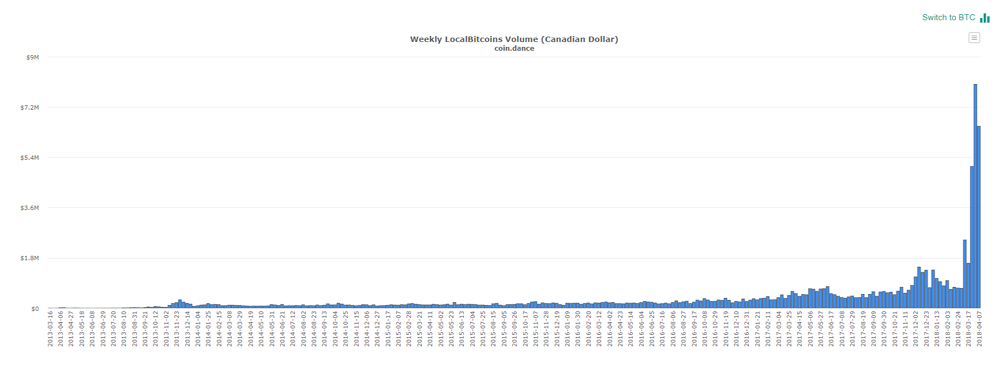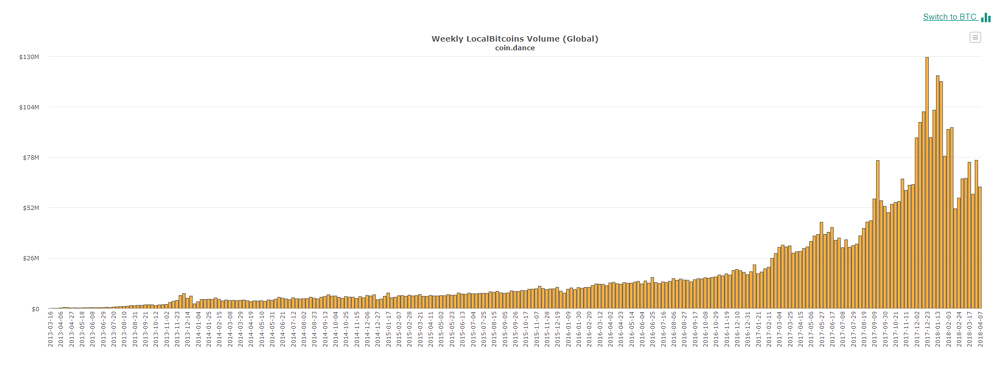
Sowa Labs, a subsidiary of Boerse Stuttgart, Germany’s second-largest stock exchange, has announced a forthcoming cryptocurrency app. The new app, Bison, is expected to be made available in German during Autumn, with an English version expected soon after.
Also Read: Russian Court Bans Telegram, Founder Pavel Durov Defiant
Boerse Stuttgart Subsidiary Announces Forthcoming App Cryptocurrency Trading
 Bison will be made available free of charge and is designed to provide a simple means for investors to gain exposure to the cryptocurrency markets. Sowa Labs has claimed that Bison will be the first cryptocurrency trading app to be backed by a stock exchange, and the first to be released by a German company. Bison states that will not charge additional trading fees.
Bison will be made available free of charge and is designed to provide a simple means for investors to gain exposure to the cryptocurrency markets. Sowa Labs has claimed that Bison will be the first cryptocurrency trading app to be backed by a stock exchange, and the first to be released by a German company. Bison states that will not charge additional trading fees.
The managing director at Sowa Labs, Ulli Spankowski stated “Bison makes trading in digital currencies easy. It is the first crypto app in the world to have a traditional stock exchange behind it.”
A prototype for Bison has been presented at Invest in Stuttgart – a German finance and investment trade fair. The German version of Bison is currently scheduled for release in autumn, with Boerse Stuttgart announcing that an English version will be launched later.
The app will initially offer pairings for BTC, ETH, LTC, and XRP, with the company stating that additional crypto assets will be added later.
Sowa Labs Publishes Survey on Cryptocurrencies
 Sowa Labs has conducted a survey of 1,019 crypto traders regarding their opinion on virtual currencies. Of the respondents, 81% were male 19% were female, and 54% were thirty-five years-old or younger.
Sowa Labs has conducted a survey of 1,019 crypto traders regarding their opinion on virtual currencies. Of the respondents, 81% were male 19% were female, and 54% were thirty-five years-old or younger.
16.9% of respondents confessed to possessing at a single cryptocurrency, whilst a further 18.2% stated that they owned several. The survey against evidence the cryptocurrency space to be male-dominated, with 40.6% of men stating that they have one or more crypto trading accounts, compared to just 11% of women.
More than 80% of respondents opened their first cryptocurrency trading account from 2017 onwards, with 49.1% entering the markets last year. 67.8% of respondents do not trade more often than monthly. Market participants aged over thirty-five trade with higher frequency than their younger counterparts – with 31% of older respondents trading on a weekly basis, and 11.5% making trades at least daily.
Do you think that more mainstream financial institutions will provide cryptocurrency trading apps to their customers? Share your thoughts in the comments section below!
Images courtesy of Shutterstock, Bisonapp.de
Need to calculate your bitcoin holdings? Check our tools section.
The post German Stock Exchange Subsidiary Announces Crypto Trading App Bison appeared first on Bitcoin News.
from Bitcoin News https://ift.tt/2IUTk16
German Stock Exchange Subsidiary Announces Crypto Trading App Bison

The Satoshi Revolution: A Revolution of Rising Expectations.
Section 2 : The Moral Imperative of Privacy
Chapter 7: Decentralization
Decentralization (Chapter 7, Part 1)
A lot of people automatically dismiss e-currency as a lost cause because of all the companies that failed since the 1990’s. I hope it’s obvious it was only the centrally controlled nature of those systems that doomed them. I think this is the first time we’re trying a decentralized, non-trust-based system.
–Satoshi Nakamoto
(Note: This article consciously side-steps the question of how decentralized various cryptocurrencies, such as bitcoin and ether, truly are. It assumes as a given that crypto is a paradise of decentralization compared to the central banking system.)
In 2009, Satoshi Nakamoto offered the first digital, decentralized currency that was based on algorithms rather than trust. The decentralization is key. No one person controls the operation of bitcoin; everyone can participate on an equal peer-to-peer basis. The system uses a distributed network of nodes to verify transactions that are publicly visible in an open ledger. It was something new under the sun.
The “non-trust-based system” that Satoshi described has obvious advantages. For one, people do not get screwed over by unscrupulous third parties, such as lawyers, former spouses, or banks. But the advantages of decentralization are less obvious. Centralization can be a purely practical matter, and it can be a good strategy. A business, for example, may be more efficient and profitable if decision making is controlled by one person. There is nothing intrinsically wrong with centralization. Except….
In the political sense. Centralization is disastrous to freedom because it strips choice from individuals and converts personal rights into decisions made by committees. Another term for centralized control is “social engineering.”
Through most of history, society has been viewed as the result of someone’s design. The design may be ascribed to God, a monarch, or a group of people called government. Society as a construct is taken for granted.
In his three-volume work Law, Legislation and Liberty (1973), economist and social theorist Friedrich A. Hayek referred to this position as “constructivist rationalism.” He argued vigorously against it. In a 1974 Nobel Memorial Lecture, entitled “The Pretence of Knowledge“, Hayek expressed a key objection: namely, no committee could predict the evolving needs of the interacting masses of human beings.
“The recognition of the insuperable limits to his knowledge ought indeed to teach the student of society a lesson in humility which should guard him against becoming an accomplice in men’s fatal striving to control society–a striving which makes him not only a tyrant over his fellows, but which may well make him the destroyer of a civilization which no brain has designed but which has grown from the free efforts of millions of individuals.”
Decentralization means the diffusion of power away from a central authority, down to its constituent units. Politically speaking, this usually means passing control from a national unit down to a local one. Instead of Congress or Parliament issuing law, a state or provincial government does so. Or a local council decides what a resident may or may not do with his own property, wealth and body. Local councils may be preferable to more remote authorities because they are susceptible to local influence; that is, the voice of individual constituents who live next door are far more influential than anonymous ballots that are cast in the millions.
But, even at the local level, the essential element of decentralization is lost. The essential element is not a committee or a collective decision. It is the individual. The individual is not only the basic building block of society but also the only source of rights, the only source who can say “yes” or “no” over their own lives. The logical and moral landing point for decentralization is every human being who is responsible for making peaceful choices for themselves.
In his magnum opus Human Action, the Austrian economist Ludwig von Mises described the principle of Methodological Individualism: “First we must realize that all actions are performed by individuals… If we scrutinize the meaning of the various actions performed by individuals we must necessarily learn everything about the actions of the collective whole. A social collective has no existence or reality outside of the individual members’ actions. For example, the individuals who comprised a family interacted with each other within a specific context and sum of those individual interactions was what constituted the abstraction ‘family'”.
Mises used this approach in analyzing that most complex of collective wholes–the state. Everything the state did or was could be reduced to individual actions. Mises explained, “The hangman, not the state, executes a criminal. It is the meaning of those concerned that discerns in the hangman’s action an action of the state.” Individuals who look at the hangman see the state in action only because they have created an abstraction known as ‘the state’ to provide a context for what is an individual’s action.
And yet, if only individuals act, how can collective institutions such as ‘the state’ or any co-operative venture be established within society? Easily. Consider how language evolved through human action but not through human design: this is the concept of ‘spontaneous order.’ One of Mises’ earliest works, Nation, State and Economy (1919), analyzed how complex social phenomena–such as language–were the unintended consequences of individual interactions. No committee or central authority decided to invent human speech and publish a dictionary, let alone to design a specific language like English. Individuals began communicating in order to get what they wanted from each other.
This is decentralization at work. Another classic example is how a path is forged through a forest. Twenty people each decide to take the shortest route from A to B. In doing so, each one contributes to the creation of a crude path that benefits everyone else who uses it afterward. The path becomes less crude as more people use it. They do not walk from A to B as public good; it is in their own self-interest. Yet forging the path benefits everyone else who walks it thereafter. The path is decentralization in action.
The decentralization offered by Satoshi goes farther. It does not envision individual actions that happenstantially benefit the whole. Or, rather, it envisions a decentralization that becomes an integral part of a community in which everything is transparent.
Part of the Satoshi revolution is that it turns the freedom strategy of decentralization on its head. Traditionally, decentralization has given individuals freedom by allowing them to secede from society. That is, people withdraw from the political system by refusing to pay taxes, by declining to provide personal information to the government or by otherwise saying “no.” In the ’80s, this strategy was called Browning-out because many practitioners followed the privacy and freedom recommendations of Harry Browne’s best-selling book How I Found Freedom in an Unfree World: A Handbook for Personal Freedom. Chapter 7, entitled “The Government Traps,” states, “But who is ‘society’ if not the same people who are already expressing their needs and preferences in the marketplace? If they aren’t willing to pay for the service in the free market…, who can say they’re willing to pay for it through government?…. All government actions depend upon one-sided transactions, in which an individual is forced to choose between paying for what he doesn’t want and going to jail.” Those who Browned-out from the Government Trap decentralized the power in their lives down to the personal level where the only authority over their own choices was themselves.
Satoshi’s approach to decentralization offers the solution. Like Hayek, he opposed the centralization of power, which is the theft of power from individuals. Social engineering destroys society, rather than creates it. Both Hayek and Mises witnessed the devastation of classical liberalism that resulted from two world wars, but most particularly by World War I. They watched as the promise of nineteenth century classical liberalism was confiscated by the centralizing machine of statism.
Enough. Cryptocurrency says “enough.” Give power back to the individual. And decentralization is where it all begins.
[To be continued next week.]
Reprints of this article should credit bitcoin.com and include a link back to the original links to all previous chapters
Wendy McElroy has agreed to ”live-publish” her new book The Satoshi Revolution exclusively with Bitcoin.com. Every Saturday you’ll find another installment in a series of posts planned to conclude after about 18 months. Altogether they’ll make up her new book ”The Satoshi Revolution”. Read it here first.
The post Wendy McElroy on Decentralization: “Give Power Back to the Individual” appeared first on Bitcoin News.
from Bitcoin News https://ift.tt/2qAY0Sm
Wendy McElroy on Decentralization: “Give Power Back to the Individual”

Japanese internet giant GMO has launched a service to allow customers to lend their bitcoins to the company. Customers’ bitcoin balances will be debited from their GMO Coin trading accounts once loan agreements have been reached. This program is similar to the one launched by the hacked exchange Coincheck last year.
Also read: Japan’s DMM Bitcoin Exchange Opens for Business With 7 Cryptocurrencies
GMO’s New Service
GMO Coin, the cryptocurrency subsidiary of Japanese internet giant GMO, has announced a new service to allow customers to lend their bitcoins to the company. GMO Coin described:
Virtual Currency Rental Service is a service that allows you to rent out the virtual currency held by the customer to the company so that you can receive the rental fee according to the quantity of the lent virtual currency.
 Interested customers can apply to participate in the program between April 11 and May 2, after which there will be a drawing. Currently, only bitcoin (BTC) will be supported. Customers need to specify the quantities they wish to lend in units of 10 BTC, with the minimum quantity being 10 BTC and the maximum being 100 BTC.
Interested customers can apply to participate in the program between April 11 and May 2, after which there will be a drawing. Currently, only bitcoin (BTC) will be supported. Customers need to specify the quantities they wish to lend in units of 10 BTC, with the minimum quantity being 10 BTC and the maximum being 100 BTC.
Rates and Details
 GMO Coin will review all applicants and inform customers of its decisions and of the loan procedure, which is expected in early May. Once an agreement has been reached with the company, the customer’s BTC balance will be deducted. “If there is no BTC balance in the quantity required for debiting, it [the agreement] will be automatically canceled,” the company explained.
GMO Coin will review all applicants and inform customers of its decisions and of the loan procedure, which is expected in early May. Once an agreement has been reached with the company, the customer’s BTC balance will be deducted. “If there is no BTC balance in the quantity required for debiting, it [the agreement] will be automatically canceled,” the company explained.
“The price of the target currency also fluctuates during the lending/withdrawal period,” GMO Coin warns, adding:
During the term of the loan, the loaned virtual currency cannot be sold or transferred.
 The loan period is 90 days. On the settlement date, the company will return to the customer “the same type.. [and] the same amount” of the cryptocurrency borrowed, plus interest. However, customers can recall the loan early and “within five business days after accepting cancellation at our company, we will redeem the virtual currency less the cancellation fee,” GMO Coin detailed.
The loan period is 90 days. On the settlement date, the company will return to the customer “the same type.. [and] the same amount” of the cryptocurrency borrowed, plus interest. However, customers can recall the loan early and “within five business days after accepting cancellation at our company, we will redeem the virtual currency less the cancellation fee,” GMO Coin detailed.
Reiterating that the interest on the loan will be paid on the settlement date of the loan, GMO Coin elaborated:
[The] Rental fee [of] 10 BTC is equivalent to 0.12328767 BTC, [which is] 5% / year (including tax) (round down to less than 1 Satoshi)…Taxes may be levied on loan fees.
“Rental fee = (loan amount × loan period (day) × loan rate) / 365,” GMO clarified, and gave an example that customers lending 10 BTC for 90 days will receive “(10 BTC × 90 days × 5%) / 365 = 0.12328767 BTC.”
Coincheck Launched a Similar Program
Other crypto exchanges around the world that offer leveraged trading have launched similar programs to borrow their customers’ coins.
In Japan, Coincheck, which was hacked in January, announced the launch of a similar service in May of last year. Customers could earn 1%, 2%, 3% or 5% annual interest depending on the maturity date of the cryptocurrencies loaned to the company. The service began with just BTC but the company later added 11 more cryptocurrency options.

However, Coincheck’s lending service was initially restricted by the Japanese Financial Services Agency (FSA), a representative of the exchange told news.Bitcoin.com at the time. The exchange then relaunched this program in June. Currently, new registrations are temporarily suspended.
Unlike Coincheck, whose exchange registration has not been approved by the FSA, GMO Coin is fully licensed. It did, however, recently receive a business improvement order from the FSA. GMO also operates Japan’s largest forex exchange called GMO Click, which Finance Magnates Intelligence says is the forex exchange that “was the undisputed leader throughout the whole of 2017, achieving average monthly volumes of $660.32 billion.”
What do you think of GMO’s new service? Let us know in the comments section below.
Images courtesy of Shutterstock, Coincheck, and GMO.
Need to calculate your bitcoin holdings? Check our tools section.
The post Japan’s GMO Wants to Borrow Bitcoins from Customers appeared first on Bitcoin News.
from Bitcoin News https://ift.tt/2quxZnz
Japan’s GMO Wants to Borrow Bitcoins from Customers

Yahoo! Japan has confirmed that it is entering the crypto space by acquiring a stake in a Japanese cryptocurrency exchange that is already licensed by the country’s financial regulator. The company plans to launch a crypto exchange in the fall of this year.
Also read: Japan’s DMM Bitcoin Exchange Opens for Business With 7 Cryptocurrencies
Yahoo! Enters the Crypto Space
 Yahoo! Japan Corporation (TYO: 4689) announced on Friday that it is entering the cryptocurrency space. The company expects to launch an “easy-to-use exchange” for cryptocurrencies in the fall of this year, Nikkei elaborated.
Yahoo! Japan Corporation (TYO: 4689) announced on Friday that it is entering the cryptocurrency space. The company expects to launch an “easy-to-use exchange” for cryptocurrencies in the fall of this year, Nikkei elaborated.
Founded in January 1996 as a joint venture between Yahoo! and Japanese multinational conglomerate Softbank, Yahoo! Japan continues to dominate the Japanese internet industry while Yahoo! has been declining in popularity since the late 2000s.
 Through its wholly owned subsidiary Z Corporation, Yahoo! Japan confirmed the purchase of a 40 percent stake in a crypto exchange called Bitarg Exchange Tokyo Co. Ltd. A person familiar with the matter said that the deal is likely to “total 2 billion to 3 billion yen ($18.6 million to $27.9 million),” Reuters reported. The remaining 60% is still owned by CMD Lab, the parent company of Bitarg.
Through its wholly owned subsidiary Z Corporation, Yahoo! Japan confirmed the purchase of a 40 percent stake in a crypto exchange called Bitarg Exchange Tokyo Co. Ltd. A person familiar with the matter said that the deal is likely to “total 2 billion to 3 billion yen ($18.6 million to $27.9 million),” Reuters reported. The remaining 60% is still owned by CMD Lab, the parent company of Bitarg.
“We decided to expand the virtual currency business by collaborating with Z Corporation,” CMD Lab Representative Director Yoon Hee Yuan confirmed.
A Stake in a Licensed Exchange
Last month, Bitarg denied reports of Yahoo! Japan’s investment in the company, stating that many possibilities were being explored. However, Bitarg posted a notice on its website on Friday, stating:
Today, the company decided to accept capital participation from Z Corporation…the company will be able to utilize the service operation and security expertise of the Yahoo Japan Group, which will make it easier for customers, [in order] to prepare for the start of the exchange service managed by the company and to improve the operation after the commencement.
 Bitarg was established in May of last year. However, the exchange temporarily suspended its service in August 2017, according to Business Insider Japan. The company received a license from the Financial Services Agency (FSA) to trade bitcoin (BTC) in December of last year. According to the news outlet, the exchange service has not resumed as of April 13.
Bitarg was established in May of last year. However, the exchange temporarily suspended its service in August 2017, according to Business Insider Japan. The company received a license from the Financial Services Agency (FSA) to trade bitcoin (BTC) in December of last year. According to the news outlet, the exchange service has not resumed as of April 13.
In a recent interview with Sankei, Yahoo! Japan Vice President Kentaro Kawabe explained:
The FSA is stating that [their] review will be tightened for new registrations of virtual currency exchanges, and it will be difficult to enter [the space] without [the] acquisition [of existing exchanges].
The FSA has been inspecting all cryptocurrency exchanges in the country and actively issuing business improvement and business suspension orders, following the hack of Coincheck. Six companies have already withdrawn their applications to operate crypto exchanges in the country.
What do you think of Yahoo! Japan entering the crypto space? Let us know in the comments section below.
Images courtesy of Shutterstock, Bitarg, CMD Lab, and Yahoo! Japan.
Need to calculate your bitcoin holdings? Check our tools section.
The post Yahoo! Japan Confirms Entrance Into the Crypto Space appeared first on Bitcoin News.
from Bitcoin News https://ift.tt/2JKZ4LQ
Yahoo! Japan Confirms Entrance Into the Crypto Space

The volume of P2P bitcoin trade in Canadian dollars has increased significantly since leading banks in the country imposed bans on crypto-related transactions. Toronto-Dominion Bank, the Royal Bank of Canada, and more recently the Bank of Montreal have limited or prohibited the use of their services and products to acquire cryptocurrencies. As a result, the weekly CAD trade on Localbitcoins has passed C$8 million at the end of March.
Also read: Crypto Exchanges Launch P2P Platforms from Latvia and Bulgaria
Circumventing the Ban
Trying to bypass various bans introduced by major banks, Canadians are switching to peer-to-peer cryptocurrency trade. The volume of bitcoin trading in Canadian dollars on Localbitcoins, a leading global P2P platform, has increased six times in the last three weeks, Decentral Post reported. The latest data from Coin Dance shows a record high at the end of last month. More than C$8 million worth of bitcoins has been exchanged in the week of March 31, 2018.

Several Canadian banks have imposed restrictions on cryptocurrency transactions over the past months. In March, the country’s biggest bank, Toronto-Dominion Bank, banned its customers from purchasing cryptos like bitcoin. Canada’s second largest bank, the Royal Bank of Canada, announced it would allow crypto-related transactions only in limited circumstances. More recently, the Bank of Montreal prohibited the holders of its credit and debit cards to acquire crypto assets.
The Bank of Montreal, or BMO Financial Group, was expected to provide banking services to a project aimed at launching a new cryptocurrency brokerage in Canada. Last month, the operator of the Toronto Stock Exchange, TMX Group, revealed plans to offer its customers the opportunity to buy and sell bitcoin and ethereum through a subsidiary. TMX has announced a partnership with the fintech startup Paycase Financial Corp. to set up the brokerage platform. The group also said it was cooperating with BMO.
Other Canadian banks still allow crypto-related credit card transactions, as news.Bitcoin.com reported. Among them are the Bank of Nova Scotia and the National Bank of Canada.
Clamping Down on Bitcoin Trade
The change of banking policies in Canada comes amid a global clampdown on crypto trade by leading card issuers. In the US, Bank of America, JP Morgan Chase and Citigroup refuse to accept credit card transactions from cryptocurrency exchanges. Major British banks, including the UK’s largest retail bank, Lloyds Bank, the Bank of Scotland, Halifax, and MBNA, have also banned credit card holders from buying cryptocurrencies.
India’s major commercial banks – ICICI Bank, Citibank, HDFC Bank, Kotak Mahindra Bank, and the State Bank of India – have suspended crypto-trading accounts. The volume of bitcoin trade on local exchanges has dropped as much as 90% in two months. Last week, the Reserve Bank of India ordered all Indian banks to suspend services to businesses working with cryptocurrency. Shortly after, the State Bank of Pakistan told commercial banks and payment providers to refrain from dealings with digital coins and tokens.

P2P platforms are offering traders around the world the opportunity to exchange cryptocurrencies and circumvent restrictions. Coin Dance’s charts show a rising trend in Localbitcoins’ global trade volumes, as well. Buyers and sellers have exchanged BTC worth almost $76.5 million USD in the week ending on March 31. The euro trade has also jumped to more than €11.4 million during the same period, proving a growing interest in peer-to-peer exchange. New P2P platforms on the Old Continent are bringing together more crypto buyers and sellers.
Are you using services offered by a peer-to-peer exchange? Tell us in the comments section below.
Images courtesy of Shutterstock, Coin Dance.
Do you agree with us that Bitcoin is the best invention since sliced bread? Thought so. That’s why we are building this online universe revolving around anything and everything Bitcoin. We have a store. And a forum. And a casino, a pool and real-time price statistics.
The post P2P Trade Spikes in Canada Amid Bank Restrictions on Crypto Transactions appeared first on Bitcoin News.
from Bitcoin News https://ift.tt/2quYTvE
P2P Trade Spikes in Canada Amid Bank Restrictions on Crypto Transactions

A total of nine cryptocurrency exchanges in Japan have suspended their operations so far. This includes the latest two, one of which was sanctioned by the Japanese financial regulator on Wednesday while the other voluntarily withdrew its license application.
Also read: Japan’s DMM Bitcoin Exchange Opens for Business With 7 Cryptocurrencies
Blue Dream Japan
 The Japanese Financial Services Agency (FSA) issued a business improvement and suspension order to Blue Dream Japan Co. Ltd on Wednesday after an on-site inspection was carried out. The company must halt all activities related to its crypto exchange business from April 11 to June 10.
The Japanese Financial Services Agency (FSA) issued a business improvement and suspension order to Blue Dream Japan Co. Ltd on Wednesday after an on-site inspection was carried out. The company must halt all activities related to its crypto exchange business from April 11 to June 10.
Following the FSA’s order, Blue Dream Japan issued a statement, “We will solemnly accept the business suspension order and business improvement order,” adding that they “promise to seriously respond, [and] we will do our utmost to resume our service.” Furthermore, the company wrote:
We hope to continue [our] virtual currency exchange business in the future after conducting thorough compliance with laws and regulations and improving the management system so that we can provide services that users can use with confidence.
Campfire’s Firex
 Another company has also announced the withdrawal of its application with the FSA to operate a crypto exchange. Campfire, a leading crowdfunding site in Japan, operates the cryptocurrency exchange Firex, which was launched in March of last year.
Another company has also announced the withdrawal of its application with the FSA to operate a crypto exchange. Campfire, a leading crowdfunding site in Japan, operates the cryptocurrency exchange Firex, which was launched in March of last year.
The company has voluntarily suspended its crypto exchange services. “We aimed to fully renew [our] exchange system,” Campfire wrote and elaborated:
We have been preparing to register the virtual currency exchange…However, in order to build a perfect service system in terms of customer asset protection and convenience, we decided that [a] further review of the plan is necessary.
9 Exchanges Suspended Operations So Far
 Prior to the hack of one of the country’s largest crypto exchanges, Coincheck, Japan had 16 licensed crypto exchanges and 16 “quasi-operators” of cryptocurrencies, also called “deemed dealers.” These are companies that have applied for licenses but have not been approved. Both Blue Dream Japan and Campfire fall into this category.
Prior to the hack of one of the country’s largest crypto exchanges, Coincheck, Japan had 16 licensed crypto exchanges and 16 “quasi-operators” of cryptocurrencies, also called “deemed dealers.” These are companies that have applied for licenses but have not been approved. Both Blue Dream Japan and Campfire fall into this category.
Coincheck was the first company to be sanctioned by the FSA since the Japanese Payment Services Act went into effect in April of last year. Following a business improvement order on January 29, the agency launched an on-site inspection of the exchange and subsequently proceeded to inspect all other exchanges as well. All quasi-operators received on-site inspections.
On March 8, the FSA issued business improvement orders to six companies. Four of them were quasi-operators – Mister Exchange, Bitcrements, Bit Station, and FSHO. The other two were fully licensed – Tech Bureau and GMO Coin.
 Then on April 6, the agency issued administrative punishment orders to three exchanges – Lastroots, Eternal Links, and another to FSHO. The latter two were also ordered to suspend operations – Eternal Links from April 6 to June 5 and FSHO from April 8 to June 7. The latest company to receive a business suspension order is the aforementioned Blue Dream Japan.
Then on April 6, the agency issued administrative punishment orders to three exchanges – Lastroots, Eternal Links, and another to FSHO. The latter two were also ordered to suspend operations – Eternal Links from April 6 to June 5 and FSHO from April 8 to June 7. The latest company to receive a business suspension order is the aforementioned Blue Dream Japan.
In addition, a total of six crypto exchanges are reportedly withdrawing their applications following the inspections by the FSA – Tokyo Gateway, Mr. Exchange, Raimu, Bitexpress, Bit Station, and now Campfire.
What do you think of Japanese exchanges suspending operations? Let us know in the comments section below.
Images courtesy of Shutterstock, Blue Dream Japan, Campfire, and Nikkei.
Need to calculate your bitcoin holdings? Check our tools section.
The post Nine Japanese Crypto Exchanges Have Suspended Operations So Far appeared first on Bitcoin News.
from Bitcoin News https://ift.tt/2GVPkkt
Nine Japanese Crypto Exchanges Have Suspended Operations So Far

The proposed and upcoming changes to the operation of the ethereum cryptocurrency have been a matter of debate recently, with questions like employing ASIC resistance mining, capping and others splitting the community. Now an outside party is also taking issue with the concept of ethereum shifting away from PoW.
Also Read: Australia’s Digitalx Launches Cryptocurrency Investment Fund
Pure Proof of Stake Possible?
 Bitmex Research has released their latest report, meant to serve as a guide for understanding proof of stake (PoS) consensus systems and to review the latest ethereum proposal. PoS is an alternative to bitcoin’s proof of work (PoW) which is regarded by some as being less susceptible to mining centralization and more “environmentally friendly” – an issue which is often used to attack cryptocurrency mining by greatly overstating its power usage.
Bitmex Research has released their latest report, meant to serve as a guide for understanding proof of stake (PoS) consensus systems and to review the latest ethereum proposal. PoS is an alternative to bitcoin’s proof of work (PoW) which is regarded by some as being less susceptible to mining centralization and more “environmentally friendly” – an issue which is often used to attack cryptocurrency mining by greatly overstating its power usage.
The very basic idea is that instead of miners controlling the system, coin holders will guide it based on each’s share of the pie. This is meant to align the cryptocurrency with the interests of long term investors. (For a more complete technical explanation you can read Bitmex’s paper which also includes a Q&A with Vitalik Buterin.) However, PoS also brings its own set of problems which the researchers study based on previous cases and explore how they can be mitigated.
The first issue is the “nothing at stake” problem, wherein the same stake can be applied to multiple competing chains for risk-free rewards, unlike PoW systems with energy costs. Another potential issue with PoS is the so called “long range attack” problem, allowing someone to buy a private key which had a large token balance in the past and then generate an alternative history from that point. Lastly, the researchers point to the issue of “stake grinding” with pure PoS, wherein stakers could try to manipulate the content in blocks in order to allocate themselves future blocks, resulting in the use of more and more computing power to try alternative blocks and essentially recreating a PoW system.
Proof of Work Here to Stay
 When looking at Casper specifically, compared with previous attempts at PoS, Bitmex finds its hybridization approach will not necessarily lead to eventually bypassing PoW down the line as intended. The researchers’ final conclusion is that the proposal leaves ether very reliant on PoW mining, both for block production and for ensuring the system converges on one chain.
When looking at Casper specifically, compared with previous attempts at PoS, Bitmex finds its hybridization approach will not necessarily lead to eventually bypassing PoW down the line as intended. The researchers’ final conclusion is that the proposal leaves ether very reliant on PoW mining, both for block production and for ensuring the system converges on one chain.
Bitmex explain that: “Although PoS mining may mitigate some risks, it is unclear if it makes a net contribution to convergence or security. Critics of PoS could therefore argue that any rewards redistributed from PoW miners to stakers unnecessarily dilutes system convergence and security.” And they add: “Although we think the current relatively conservative proposal could work, the nothing at stake problem could be a significant challenge. Therefore despite the plan to use this proposal as a stepping stone, as part of a gradual shift towards a full PoS system, this will be significantly more difficult to achieve than some in the Ethereum community think.”
Is switching from PoW to PoS a good idea for any cryptocurrency? Share your thoughts in the comments section below.
Images courtesy of Shutterstock.
Do you agree with us that Bitcoin is the best invention since sliced bread? Thought so. That’s why we are building this online universe revolving around anything and everything Bitcoin. We have a store. And a forum. And a casino, a pool and real-time price statistics.
The post Bitmex Research: We Doubt Ethereum’s Ability to Reduce Reliance on PoW appeared first on Bitcoin News.
from Bitcoin News https://ift.tt/2GUOYdA
Bitmex Research: We Doubt Ethereum’s Ability to Reduce Reliance on PoW

According to the blockchain firm Nchain and its CEO Jimmy Nguyen, the company has secured its first approved patent recognized by the European Patent Office. The patent involves an invention that provides a method for an automated management and blockchain-enforced smart contracts.
Also Read: Australia’s Digitalx Launches Cryptocurrency Investment Fund
Blockchain Firm Nchain Gets an Automated Management and Smart Contract Patent Approved by the European Patent Office
 Nchain is a blockchain technology-based research and development organization led by Jimmy Nguyen, chief scientist Dr. Craig Wright, and over sixty researchers, engineers, and other professionals based in Europe and Canada. Over the past couple of weeks, Wright has been releasing a series of research papers that apply to the bitcoin infrastructure and the overall network. The subjects discussed within his latest papers include Turing completeness for the bitcoin protocol, and other mathematical distributed consensus critiques.
Nchain is a blockchain technology-based research and development organization led by Jimmy Nguyen, chief scientist Dr. Craig Wright, and over sixty researchers, engineers, and other professionals based in Europe and Canada. Over the past couple of weeks, Wright has been releasing a series of research papers that apply to the bitcoin infrastructure and the overall network. The subjects discussed within his latest papers include Turing completeness for the bitcoin protocol, and other mathematical distributed consensus critiques.
Now the firm has secured its first approved patent among many filings with the European Patent Office (EPO). The patented invention was curated by Wright and claims it will allow the storing of metadata, implementing digital tokens, and smart contract management. According to an interview with Nchain’s Jimmy Nguyen and Coingeek columnist Cecille De Jesus, the CEO explains that the IP assets will be available for free for individuals and development teams dedicating their energy to the Bitcoin Cash network. Nguyen explains the EPO approval is a milestone for Nchain and he expects more EPO filings will be approved.
“This first patent grant by the European Patent Office marks a major milestone in Nchain’s ambitious research and patent program, which started approximately two years ago,” Nguyen explains.
We expect this will be the first of many more patents to come, as our portfolio of blockchain patent applications is among the largest – if not the largest – in the world.
Metadata, Digital Tokens, and Smart Contract on Bitcoin Cash
Nchain’s patent titled, “Registry and Automated Management Method for Blockchain-Enforced Smart Contracts,” is described as a computer-implemented method of storing a contract in a network repository and broadcasting a transaction with:
“At least one unspent output (UTXO); and metadata comprising an identifier indicative of the location where the contract is stored; and renewing or rolling the contract on by: generating a new key using data relating to a previous key associated with the contract; generating a script comprising the new key, the location of the contract and a hash of the contract; and paying an amount of currency to the script.”
The patent gives an explanation of the entire invention alongside schematics and data. Much of the invention discusses metadata implementation that can store the hash of a smart contract, repositories that can comprise a database, index, and searchable browsers. Further, it discusses security mechanisms tethered to smart contracts as well.
IP Rights for BCH Development With the ‘Nchain Open Bitcoin Cash License’
Nguyen reveals that Nchain has decided to offer the IP exclusively to the bitcoin cash (BCH) community. This means any of Nchain’s inventions will be made available for BCH developers and development teams through the use of a BCH-based license.
“While we are building enterprise value through our patent portfolio, Nchain is committed to using our intellectual property to benefit the bitcoin cash community,” Nguyen notes. “We intend to make key IP assets available for free usage only on the Bitcoin Cash blockchain – through our new ‘Nchain Open Bitcoin Cash License.’”
This will give Bitcoin Cash significant advantages over other blockchains, and will incentivize businesses to operate on the BCH blockchain, which represents the original vision of Bitcoin.
What do you think about Nchain getting a patent approved by the EPO? What do you think about them creating an open BCH license? Let us know in the comments below.
Images via Shutterstock, Nchain’s patent schematics, and Pixabay.
Make your voice heard at vote.Bitcoin.com. Voting requires proof of bitcoin holdings via cryptographic signature. Signed votes cannot be forged, and are fully auditable by all users.
The post Nchain to Offer Smart Contract Patents Exclusively to the Bitcoin Cash Community appeared first on Bitcoin News.
from Bitcoin News https://ift.tt/2GTWp55
Nchain to Offer Smart Contract Patents Exclusively to the Bitcoin Cash Community

Long Blockchain Corp., the company formerly known as Long Island Iced Tea Corp., has announced that it has received a delisting determination from Nasdaq. The U.S.-based company made headlines in December after its name change triggered a 432% gain in the price of its shares over the course of a single day.
Also Read: Bitcoin in Brief Thursday: Crypto Winter Is Almost Over
Long Blockchain Receives Delisting Determination
 On the 10th of April, Long Blockchain Corp. revealed that it had received a “delisting determination letter from the Hearings Panel of The Nasdaq Stock Market LLC relating to the company’s common stock.”
On the 10th of April, Long Blockchain Corp. revealed that it had received a “delisting determination letter from the Hearings Panel of The Nasdaq Stock Market LLC relating to the company’s common stock.”
Long Blockchain Corp. had been informed on the 15th of February by the Staff of Nasdaq’s Listing Qualifications Department that a “determin[ation] to delist the company’s securities” had been made. The company appealed the determination, with a hearing having occurred on the 22nd of March.
The Hearings Panel chose to uphold the delisting determination, with Long Blockchain Corps’s shares scheduled to be “suspended on the Nasdaq Capital Market at the opening of business on April 12, 2018.”
Long Blockchain to Remain Public Company Despite Delisting
 The company has stated its intention to “apply for its common stock to be quoted and traded on the OTCQB Market.” Long Blockchain Corp’s stock will also “be eligible for trading and quotation on the Pink Current Information tier operated by the OTC Markets Group Inc.”
The company has stated its intention to “apply for its common stock to be quoted and traded on the OTCQB Market.” Long Blockchain Corp’s stock will also “be eligible for trading and quotation on the Pink Current Information tier operated by the OTC Markets Group Inc.”
The company has also stated that the relegation to “the over-the-counter market does not diminish the focus of its efforts to become a leader in blockchain technology.”
Markets Crack Down on Misleading Affiliations With Blockchain Technology
 In December 2017, Long Blockchain Corp’s share price exploded by over 400% in a single day, following its renaming from Long Island Iced Tea Corp. The company was one of many apparently seeking to cash in on the over-exuberant market sentiment surrounding cryptocurrency and distributed ledger technology in recent months via rebranding, such as Skypeople Fruit Juice – who were reported to have rebranded to Future Fintech in order reflect its unevidenced claim to be exploring distributed ledger and financial technology, driving a quick 200% pump in its share price.
In December 2017, Long Blockchain Corp’s share price exploded by over 400% in a single day, following its renaming from Long Island Iced Tea Corp. The company was one of many apparently seeking to cash in on the over-exuberant market sentiment surrounding cryptocurrency and distributed ledger technology in recent months via rebranding, such as Skypeople Fruit Juice – who were reported to have rebranded to Future Fintech in order reflect its unevidenced claim to be exploring distributed ledger and financial technology, driving a quick 200% pump in its share price.
The trend of companies announcing embellished or fraudulent ties to the blockchain sector has also struck China’s markets, with China Money Network reporting that “More than 20 listed companies have been questioned by the Shenzhen and Shanghai exchanges about their suspicious speculation on blockchain.” The practice prompted Shenzhen Exchange to launch an investigation into companies proclaiming dubious connections to blockchain and cryptocurrency technology.
Despite triggering a quick pump in the share price of several companies, the practice of companies attempting to cultivate an exaggerated or fraudulent association with distributed ledger technology has resulted in little more than an increase in the scrutiny and suspicion with which the mainstream markets treat publicly listed crypto companies.
Do you think that the wave of companies seeking to falsely associate themselves with blockchain and crypto is slowing down? Or just beginning? Share your thoughts in the comments section below!
Images courtesy of Shutterstock
Want to create your own secure cold storage paper wallet? Check our tools section.
The post Long Blockchain Corp Receives Delisting Determination From Nasdaq appeared first on Bitcoin News.
from Bitcoin News https://ift.tt/2GXqJLO


